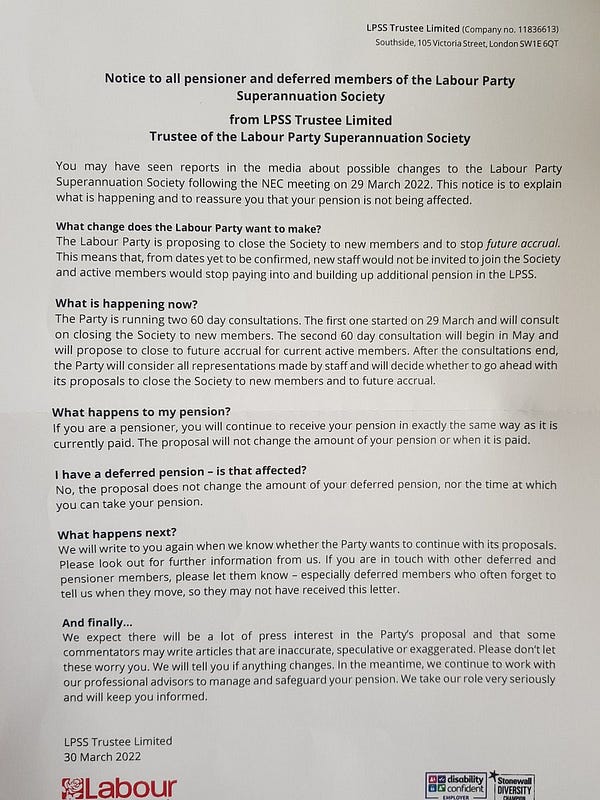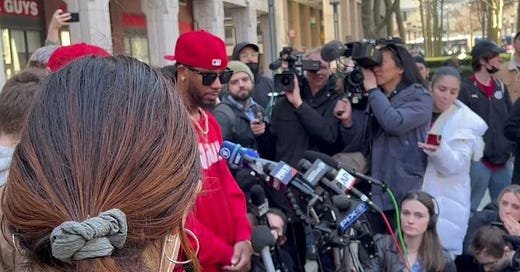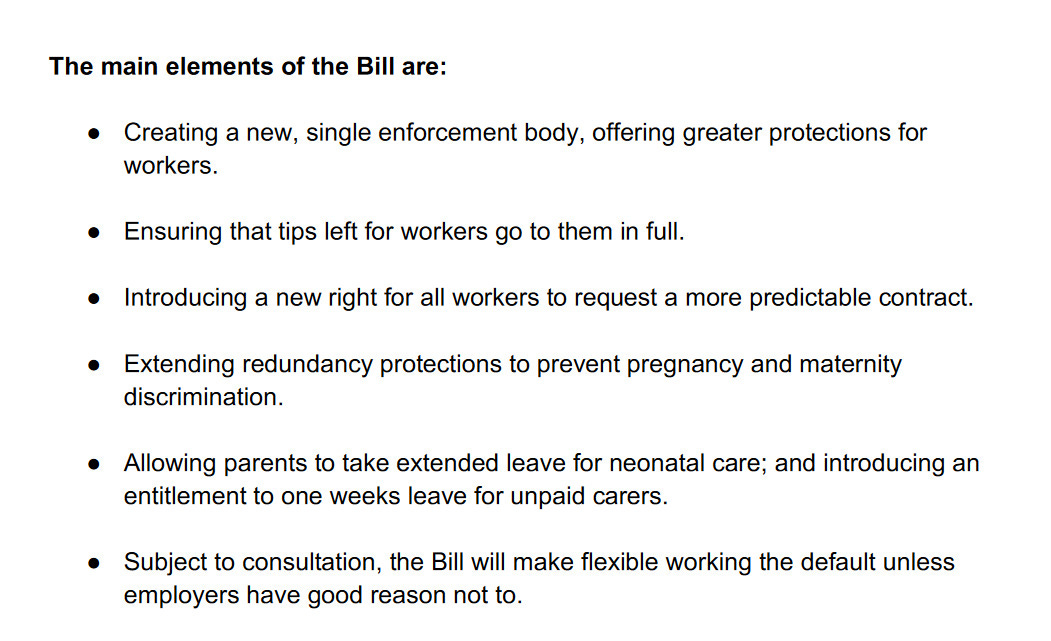Historic Amazon win - Employment Bill delayed (again) - UK union revival?
28 March - 3 April 2022
We’ve just had a momentous week for workers. No, it was not because of the launch of The Week in Work newsletter. It was because for the first time Amazon workers in the US won a union election. It was a fight against the odds, where a grassroots union with a GoFundMe page beat one of the richest corporations in the world.
On the other side of the Atlantic, there are also signs that industrial action is on the rise, but there seems to be little hope of genuine legislative change as the long awaited Employment Bill is once again delayed. Read on for these and the other biggest stories from the world of work.
DISPUTES
Historic Amazon union win: Amazon Labour Union’s successful union election at the JFK8 warehouse in Staten Island, New York, is being heralded as one of the greatest union victories in recent US history.


The grassroots union that was formed only a year ago, not only became the first union to win an election at an Amazon warehouse, but did so without the support of mainstream unions or leading lights from the Democratic Party.
The union’s president, Chris Smalls, who was dismissed by Amazon lawyers as “not smart, or articulate”, started organsinsing after being fired for leading a walkout during the pandemic. Here is his message to Bezos:

Not all action is strike action: Resistance continues in universities after two weeks of strike action. Times Higher Education reports on a growing number of external examiners resigning from their posts, while 60 LSE International Development students have signed an open letter saying they will be withholding their fees as part of a “fee strike” and another 60 say they want their fees reimbursed.
They explicitly say the action is in solidarity with the UCU strike.
P&O criminal probe: The Insolvency Service has launched criminal and civil investigations into the circumstances surrounding the redundancies of nearly 800 workers, the BBC reports. But this will do little for the workers that have lost their jobs, the vast majority of which have now accepted the terms of the redundancy.
Union revival: There were two very different takes last week on increased workplace militancy. First, the BBC focuses on home workers and freelancers, and points to an 118,000 increase in UK union members in 2020. What it fails to mention is that in the same year membership in the private sector plummeted by more than 100,000 to its lowest level since 1995.
The growth in membership in 2020 was actually in the public sector, mainly in education. Far from being forced to work from home, these workers were being thrust back into workplaces while the pandemic was still ravaging the country.
The piece also cites the General Secretary of Prospect saying the union had 12,000 new members in 2020. What it doesn’t say was how many members it lost in the same year. Prospect’s annual returns show membership increased by just over 5,000 in 2020, while members “paying into the general fund” (i.e. dues paying members) actually decreased by around 1000.
Tom Wall at the Observer tells a much more compelling story focussed on industrial action and significant wins by the largest unions over the last two years. Wall points to an increase in disputes, even if they are from a low base, with the TUC logging 300 industrial disputes in the last twelve months. Rather than precarity, the piece points to falling living standards as one of the factors pushing workers to picket lines.
Public sector pay squeeze: Public sector unions are speaking out after the UK government announced pay increases in the sector would be pegged at an average of 2%, the Guardian reports.
Shadow Chancellor Rachel Reeves refuses to say whether she would support public sector workers going on strike.

I can’t be the only one who is reminded of this interview:
Brewdog requests worker complaint details: A Brewdog representative is using European data protection law to seek information regarding complaints raised by workers on a third party platform, Good Beer Hunting reports.
Royal Fail: Unite is to start balloting Royal Mail workers over plans to sack nearly 1000 managers and bring in lower rates of pay.
Union vs union: GMB says refuse worker strikes will continue at Worthing and Adur until 10 April and council leaders say progress is being made on a joint recognition agreement with Unison and GMB, the Sussex Express reports. But there’s a slight snag. Unison, which is currently recognised, has lodged a complaint against the GMB at the TUC.
Oscar celebs (metaphorically) slap picketing workers: Workers and supporters picketed the venue of Jay-Z’s Oscar after-party, as part of a long-running dispute that kicked off when the venue’s owner sacked workers without any severance payments at the start of the pandemic, the Hollywood Reporter writes. The workers had previously asked the legendary rapper to change venues in support of their boycott, and it seems many celebs crossed the picket line to attend.
GOVERNMENT & POLITICS
Employment Bill postponed (again): The Employment Bill will not be in the Queen’s Speech in May, once again delaying long-awaited reforms to UK employment law and enforcement, the FT reports.
While the article picks up on changes to flexible working rules and the creation of a single enforcement body, it misses out many other changes the bill was expected to bring about.
When it was first introduced in the 2019 Queen’s speech, the bill included proposals to guarantee that workers would receive 100% of their tips, greater protections against pregnancy discirmination and the right to request a more predictable contract, among other reforms. So far, none of these changes have made it to the statute books.
For the nostalgic among you, I’m leaving a screenshot of the 2019 Queen’s Speech briefing notes.
Sex workers at risk with strip club ban: Edinburgh council has passed a blanket ban on strip clubs, which will force the existing strip clubs in the city to close. United Sex Workers said the move will force over 100 strippers to work in unregualted and unsafe spaces.
Labour’s labour woes: Two former Labour party staffers were asked to sign non-disclosure agreements after making complaints of sexual harassment against a senior official, the BBC’s Rianna Croxford has revealed.
This comes on the same week as news that the party has started a consultation on the closure of the staff defined benefit pension scheme.


Pension compensation: The Financial Conduct Authority has announced that British Steel pension holders who were misled into switching schemes could receive a total of £71.2m in compensation.
Learning fund: Welsh government has announced £13 million in funding for unions to deliver training and education.
Biden’s labour enforcement defeat: The US Senate has voted down Biden’s nominee for the Labor Department’s Wage and Hour Division administrator, the country’s top wage enforcer. David Weil had been critical of gig economy companies and had proactively extended the number of workers eligible for paid overtime when he previously held the role under the Obama presidency, Politico reports.
GIG ECONOMY
Deliveroo delivers CEO pay rise: Deliveroo CEO Will Shu’s pay increased by 16% to £600,000 this year and is expected to receive nearly £5m of shares in April 2023, as part of a £30m package over the next six years, the Guardian reports.
Yango-ing going and gone: Russia’s Yandex is putting its supermarket delivery business, Yango Deli, up for sale, according to the Telegraph. Yango Deli launched in London in October last year and openned four warehouses in the capital.
GENDER
Unpaid care work: Nearly half of working-age women are providing an average of 45 hours of unpaid care every week, compared to 25% of men who provide 17 hours, according to a new report by the Centre for Progressive Policy.
MODERN SLAVERY
Cadbury child labour: A Dispatches documentary that will air tonight (4 April) alleges children as young as 10 have been found working in Ghana harvesting cocoa to supply Cadbury’s parent company. Campaigners say the farmers are being paid less than £2 a day and can’t afford to hire adult workers.

Paying to work: Migrant workers have been forced to pay billions of dollars in recruitment fees to secure jobs in World Cup host nation Qatar, a Guardian investigation has found. Workers from Bangladesh and Nepal, who make up around a third of the 2 million foreign workers in Qatar, typically pay fees of $3,000 to $4,000 and $1,000 to $1,500 respectively. Once in Qatar they earn as little as $275 a month, meaning they have to work for at least a year to pay off their recruitment fees.
Government funding exploitative projects: Six migrant workers employed on Middle Eastern projects backed by the UK government credit agency, UK Export Finance, have revealed low pay, safety hazards, excessive working hours, and the denial of freedom of movement as persistent issues, according to a Guardian investigation.
HEALTH AND SAFETY
Construction deaths: 24 construction workers died on site between April and December 2021, 10 of which were because of falls from height, according to news HSE data, Construction News reports.
Asbestos conviction: A demolition company boss who falsely claimed to be an asbestos-removal specialist registered with the Environment Agency, has been given a 12-month suspended prison sentence, the Construction Enquirer reports. He was found to have stashed waste asbestos in hired storage containers located just 200 metres from a school.
WINS
Hospital workers were sick of it: Outsourced Croydon Hospital porters and “domestics” have called off their planned strike after winning a 24% pay rise with backpay and an occupational sick pay scheme.
A hat tip to Pizza Express workers: Pizza Express waiting staff have won back the right to 70% of tips made on credit cards, a change that is worth around £2000 a year. The restaurant has reversed its decision to split tips evenly between waiting staff and kitchen staff, who are better paid and get more guaranteed hours.
WHAT’S COMING UP
4 April: Dispatches documentary on child labour in Cadbury’s supply chain.
4 April - 10 April: Adur and Worthing refuse worker strike.
4 - 8 April: Unison higher education strikes.
5 April: Coventry refuse worker rep Pete Randle disciplinary hearing and solidarity demo.
5 April: Writing and Performance Workshop for zero hours contract workers.
6 April: Workers recruited from this day through the seasonal worker visa scheme must be paid £10.10 per hour.
6 April: Launch of Fairwork report on platform companies operating in Belgium.
7 April: Airbus Broughton workers scheduled to strike.
11-14 April: NEU national Conference.
12-13, 16 -17 and 21 – 22 April: North Somerset refuse workers strike.
14 April: Fox’s Glacier Mint strike.
16 April, 30 April, 4 June and every Saturday: TransPennine Express strike.
24-29th April: CWU national Conference.
28 April: Workers’ Memorial Day.
FEEDBACK
Did I miss anything? Do you have a dispute, event, tribunal case or report that you think I should include? Email me on theweekinwork [at] gmail [dot] com.





